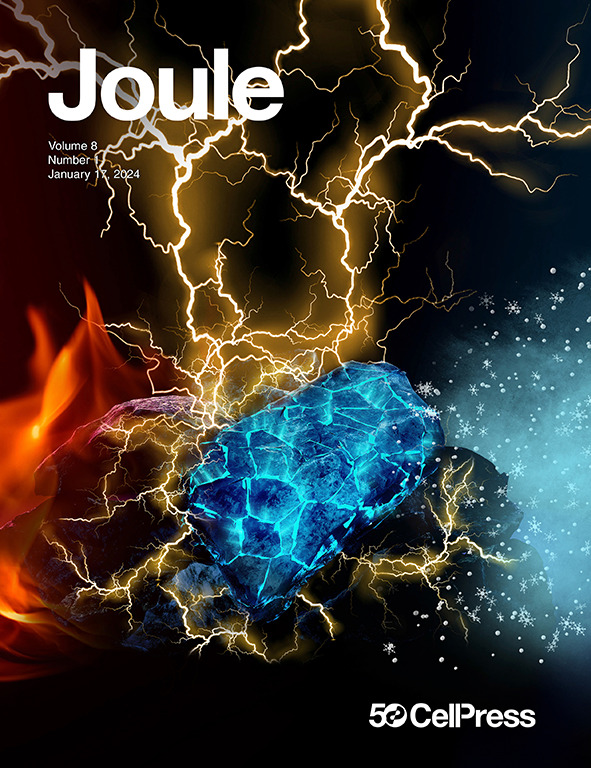Interfacial droplet-based triboelectric nanogenerator with optimized architecture for highly efficient vibrational energy conversion
IF 38.6
1区 材料科学
Q1 CHEMISTRY, PHYSICAL
引用次数: 0
Abstract
Droplet-based nanogenerators, harnessing the dynamic interaction between droplets and tribo-layer surfaces for electricity generation, demonstrate substantial promise in nano-micro energy harvesting. However, conventional devices face limitations in charge and voltage outputs due to the constrained liquid-solid interface and intrinsic parasitic capacitance, resulting in comparatively low power density. Herein, regulated by heterogeneous wetting surfaces, the periodic squeezing of a 3D droplet to a 2D plate maximizes the effective interface for triboelectrification and electrostatic induction, leading to a remarkable charge density of ∼2.0 C m−3. Additionally, optimizing electrode configuration reduces parasitic capacitance and elevates output voltage by 80 folds. A recorded peak power density of 5,865 W m−3 is obtained, which is 48 times higher than previous works. Furthermore, the droplet’s non-Hookean elastic behavior extends the frequency response band by 89.3%, enabling small electronics to operate under micro-vibration conditions. This study offers valuable insights for efficient electric energy extraction from interfacial droplets.


基于界面液滴的三电纳米发电机,结构优化,可实现高效振动能量转换
基于液滴的纳米发电机利用液滴与三层表面之间的动态相互作用进行发电,在纳米微能量收集方面前景广阔。然而,由于液固界面的限制和固有寄生电容,传统设备在电荷和电压输出方面面临限制,导致功率密度相对较低。在这里,在异质润湿表面的调节下,三维液滴周期性地挤压到二维板上,使三电化和静电感应的有效界面最大化,从而使电荷密度达到 2.0 C m-3。此外,电极配置的优化降低了寄生电容,并将输出电压提高了 80 倍。所记录的峰值功率密度为 5,865 W m-3,比以前的研究成果高出 48 倍。此外,液滴的非胡肯弹性行为将频率响应带扩展了 89.3%,使小型电子设备能够在微振动条件下运行。这项研究为从界面液滴中高效提取电能提供了宝贵的见解。
本文章由计算机程序翻译,如有差异,请以英文原文为准。
求助全文
约1分钟内获得全文
求助全文
来源期刊

Joule
Energy-General Energy
CiteScore
53.10
自引率
2.00%
发文量
198
期刊介绍:
Joule is a sister journal to Cell that focuses on research, analysis, and ideas related to sustainable energy. It aims to address the global challenge of the need for more sustainable energy solutions. Joule is a forward-looking journal that bridges disciplines and scales of energy research. It connects researchers and analysts working on scientific, technical, economic, policy, and social challenges related to sustainable energy. The journal covers a wide range of energy research, from fundamental laboratory studies on energy conversion and storage to global-level analysis. Joule aims to highlight and amplify the implications, challenges, and opportunities of novel energy research for different groups in the field.
 求助内容:
求助内容: 应助结果提醒方式:
应助结果提醒方式:


